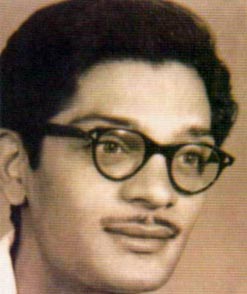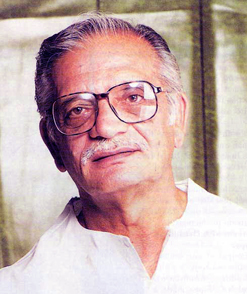
Gulzar is a poet above all things. His style marks a sensitivity that is best reflected through his writing and treatment of films. He is one of those sensitive people whose work is laced with the lyrical but psychologically adept examination of human sensibilities.
Gulzar was born on August 18, 1936 in a small town of Deena (now in Pakistan). An eager participant in antakshari and keen learner of shairis, he was inclined towards literature and poetry right from his school days. Gulzar also used to listen to a lot of Hindustani music, especially stringed instruments, which would be practised in his neighbours' homes. He became even deeply engrossed in music when he started going to college, and would regularly attend concerts of artists like Ravi Shankar and Ali Akbar Khan.
Gulzar and his family were one of the many to have suffered the pangs of partition. The family moved to Amritsar (India) but Gulzar, to fullfill his dreams, came to Bombay. In order to earn his daily bread, Gulzar started to work as a garage mechanic in Worli while writing poetry in his spare time. Gulzar, as any other dreamer who comes to Bombay for the first time, was bitten by the film bug. Making a modest beginning as an assistant to Bimal Roy, Hrishikesh Mukherjee and Hemant Kumar, he wrote his first song 'Mora Gora Ang Lai Le..' for Bimal Roy´s film Bandini. Bimal Roy, always one to encourage young talent gave him the opportunity to write songs. He became Bimalda's full-time assistant. He then began writing for films for directors like Hrishikesh Mukherjee and Asit Sen. Some of the films that Gulzar has written include Anand (1970), Guddi (1971), Bawarchi (1972) and Namak Haram (1973) for Hrishida and Do Dooni Char (1968), Khamoshi (1969) and Safar (1970) for Asit Sen.

Gulzar With Mere Apne in 1971, he donned the role of a filmmaker. Gulzar went on to make Parichay (1972) and Koshish (1972), a sensitive look at the travails of a deaf - dumb couple superbly played by Sanjeev Kumar and Jaya Bhaduri. With these films also began a mutually beneficial partnership with Sanjeev Kumar. The Gulzar - Sanjeev Kumar partnership resulted in such fine films as Aandhi (1975), Mausam (1975), Angoor (1981) and Namkeen (1982) and represent Sanjeev Kumar's finest work as an actor. With his sensitive yet successful films, stars like Jeetendra (Parichay, Khushboo (1975), Kinara (1977), Vinod Khanna: Achanak (1973), Meera (1979) and Lekin (1990) and Hema Malini: Khushboo (1975), Kinara (1977), Meera (1979) worked with Gulzar to gain respectability as artists and it must be said that some of their best and most introspective work has come in these films.
Gulzar´s famous television serial Mirza Ghalib displayed his finesse as a writer and director through a superb depiction of the life of the legendary poet. He had even waived his own fees to try and maintain the budget for this serial. The period 1971 to 1986 found him relatively prolific, and it was only toward the close of the 1980s that he stepped back a little and kept largely out of the limelight. In 1996, the hit Maachis brought him right back in our midst, and he followed this success up with his next venture Hu Tu Tu, which garnered its share of critical acclaim. Gulzar has also involved himself in many projects that cater to a younger audience - his latest in this realm is the new album Kardi Katha, released by Skymusic. The tracks are narrated by him. On the small screen, he has contributed to the popular TV serials Jungle Book and Potli Baba Ki, with songs, narration and some typical Gulzar magic.
Gulzar has been honoured time and again for his work. This includes winning the National Award thrice - Best Screenplay for Koshish, Best Director for Mausam and Best Lyricist for Ijaazat. He has also won the Filmfare Award a number of times. He won the prestigiuos Academy Awards for the best song Jai Ho.. for the film Slumdog Millionaire. Gulzar is also the author of numerous books on poetry, short stories and a dozen books for children. A story book for children 'Ekta' received an award from the National Council for Education Research and Training (NCERT) in 1989.
 Gulzar is a poet above all things. His style marks a sensitivity that is best reflected through his writing and treatment of films. He is one of those sensitive people whose work is laced with the lyrical but psychologically adept examination of human sensibilities.
Gulzar is a poet above all things. His style marks a sensitivity that is best reflected through his writing and treatment of films. He is one of those sensitive people whose work is laced with the lyrical but psychologically adept examination of human sensibilities. Gulzar With Mere Apne in 1971, he donned the role of a filmmaker. Gulzar went on to make Parichay (1972) and Koshish (1972), a sensitive look at the travails of a deaf - dumb couple superbly played by Sanjeev Kumar and Jaya Bhaduri. With these films also began a mutually beneficial partnership with Sanjeev Kumar. The Gulzar - Sanjeev Kumar partnership resulted in such fine films as Aandhi (1975), Mausam (1975), Angoor (1981) and Namkeen (1982) and represent Sanjeev Kumar's finest work as an actor. With his sensitive yet successful films, stars like Jeetendra (Parichay, Khushboo (1975), Kinara (1977), Vinod Khanna: Achanak (1973), Meera (1979) and Lekin (1990) and Hema Malini: Khushboo (1975), Kinara (1977), Meera (1979) worked with Gulzar to gain respectability as artists and it must be said that some of their best and most introspective work has come in these films.
Gulzar With Mere Apne in 1971, he donned the role of a filmmaker. Gulzar went on to make Parichay (1972) and Koshish (1972), a sensitive look at the travails of a deaf - dumb couple superbly played by Sanjeev Kumar and Jaya Bhaduri. With these films also began a mutually beneficial partnership with Sanjeev Kumar. The Gulzar - Sanjeev Kumar partnership resulted in such fine films as Aandhi (1975), Mausam (1975), Angoor (1981) and Namkeen (1982) and represent Sanjeev Kumar's finest work as an actor. With his sensitive yet successful films, stars like Jeetendra (Parichay, Khushboo (1975), Kinara (1977), Vinod Khanna: Achanak (1973), Meera (1979) and Lekin (1990) and Hema Malini: Khushboo (1975), Kinara (1977), Meera (1979) worked with Gulzar to gain respectability as artists and it must be said that some of their best and most introspective work has come in these films.